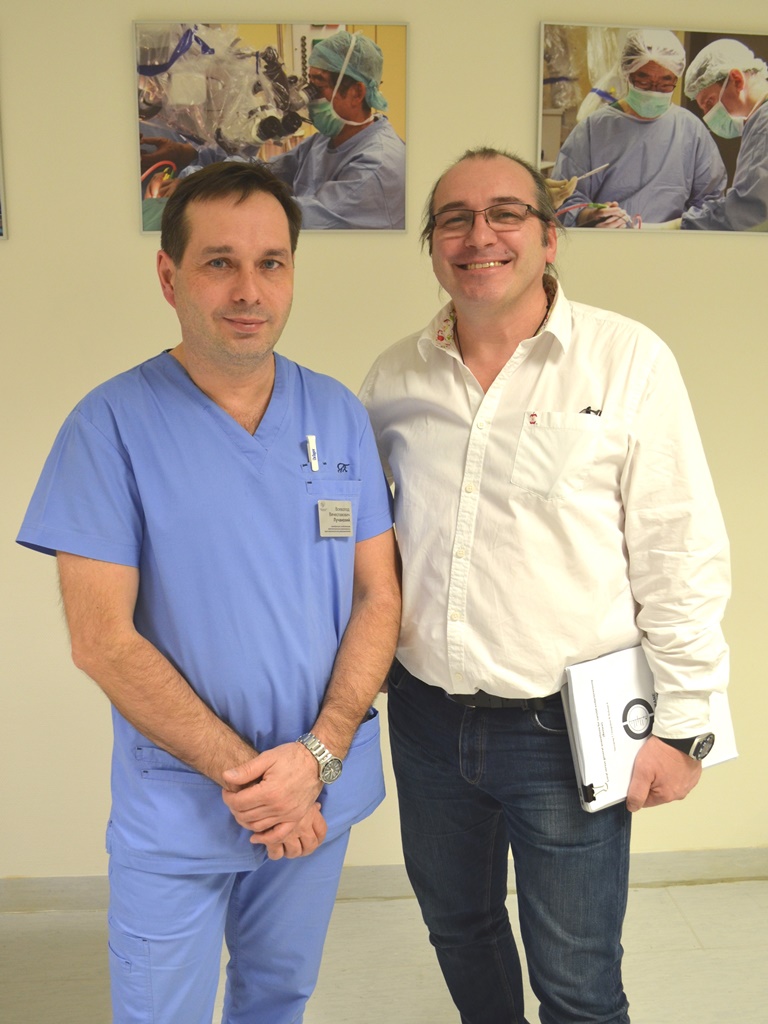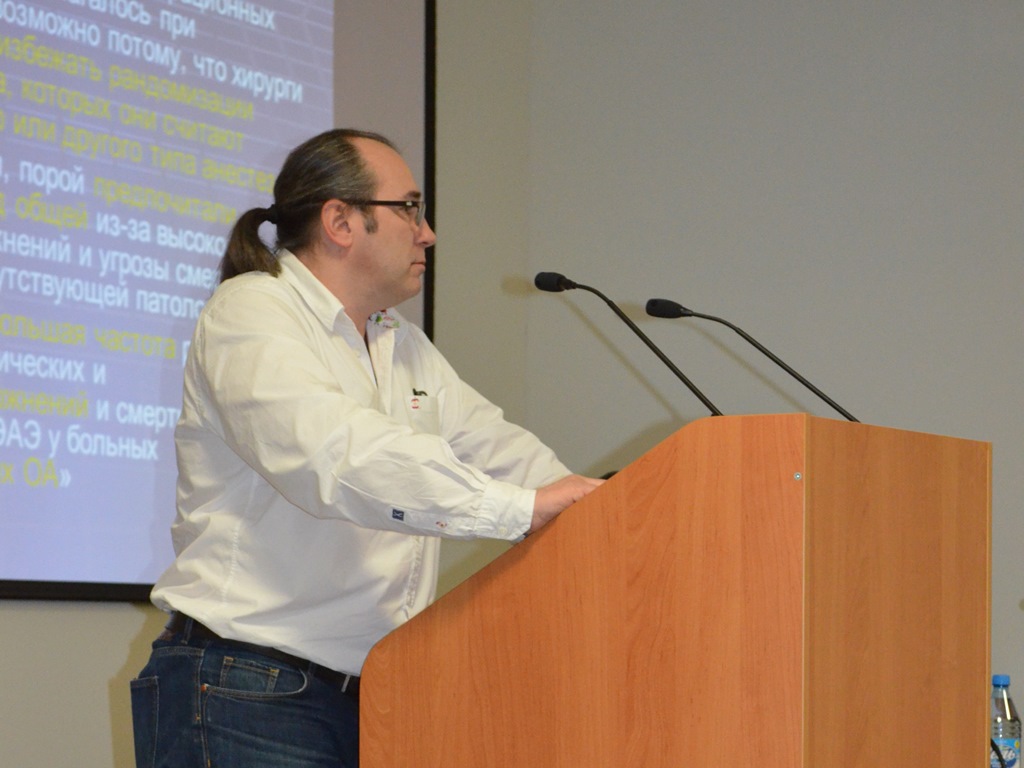Meeting of the Novosibirsk Regional Scientific and Practical Society of Anesthesiologists and Resuscitators on the theme: "New Technologies in neuroanaesthesia"
Efficient operation of any medical institution is impossible without professional doctors. Medicine is developing quite rapidly, more and more new methods and technologies for the treatment of certain diseases appear every year, so that doctors should keep his eye on the ball and be aware of current events in the world of medicine.
There is no doubt that constant self-training plays an important role in this process, but do not underestimate the social events - various conventions, conferences, exhibitions and other events organized to gather together experts of a particular field of medicine to discuss topical issues and problems.
Such events give doctors a chance to share experiences with colleagues from different medical institutions not only from our country but also from all around the world. Doctors also can make useful contacts, which further lead to a long and fruitful collaboration.
In this section, we will cover upcoming and past events, the organizers or the participants of which are doctors of our Center. And reviews about participation in various activities will be available to read.
We hope that this information will be interesting for our colleagues and will be useful in their future work. We will be glad to see you, colleagues, on medical events!
On April 02, 2015 at the Federal Neurosurgical Center a regular meeting of the Novosibirsk Regional Scientific and Practical Society of Anesthesiologists and Resuscitators on the theme: "New Technologies in Neuroanaesthesia” was held.
The chairman of the Society, Professor Vladimir P. Shevchenko led the meeting. Traditionally, video translation was organized for non-resident participants.
Аlexander Vladimirovich Shmigelsky, Doctor of Medicine, Leading researcher of the Academician N.N.Burdenko Research Institute of Neurosurgery of the Russian Academy of Medical Sciences (Moscow) , Alexander Sergeevich Kulikov, Candidate of Medical Science, researcher of the Academician N.N.Burdenko Research Institute of Neurosurgery of the Russian Academy of Medical Sciences (Moscow) and Marina Sergeevna Garder intensivist of Federal Neurosurgical Center Nososibirsk submitted their reports.
In the report entitled "Awake carotid endarterectomy in the mind is fashion or necessity?" Alexander Shmigelsky turned to the history of the problem. In the 60-ies and 70-ies carotid endarterectomy has become the most frequently performed surgery on blood vessels.
Later Dr. Shmigelsky cited data of various comparative studies of general and regional anesthesia (GA and RA). Findings showed the benefits of regional anesthesia over general anesthesia (smaller percentage of myocardial infarction, a significant reduction in the risk of death, decreased by 2 times the risk of perioperative stroke, decreased pulmonary complications, shorter hospital period and smaller cost per patient).
However, according to the protocol of GALA-trial study, significant differences between GA and RA have not been identified, there was a minor trend towards a decrease in mortality after carotid endarterectomy, performed under RA.
After statistics Alexander spoke about the criteria for selecting the method of anesthesia, the advantages and disadvantages of RA and GA. There are an indication for use of regional anesthesia:
• Patients who are impossible to carry out adequate hardware monitoring;
• The presence of inhomogeneous deformed atherosclerosis plaque;
• Open-end Willis artery or the presence of critical stenosis of the contralateral side arteries;
• Medical complications in patients with high perioperative risk and the risk of cognitive impairment;
• Patients older than 70 years.
Part of speech was devoted to the issue "Anesthetic are neuroprotectors or toxins", and also about what kind of information should be used in neuromonitoring.
Statistics on the use of regional anesthesia at Academician N.N.Burdenko Research Institute of Neurosurgery was cited, especially the use of various drugs and nuances of intraoperative tactics. Report touched on topical issues of resuscitation and aroused great interest among the audience.
The report " Performance analysis of hardware-based blood reinfusion of neurosurgical patients" Marina S. Garder in collaboration with A. Novikova and O. Zasedateleva, doctors of anesthesiology and reanimation division of Federal Neurosurgical Center Novosibirsk considered various techniques of return of blood. Intraoperative and postoperative blood reinfusion in the context of its advantages and disadvantages were discussed in details, hardware reinfusion at FNC was analyzed.
Marina S. listed indications and contraindications to the use of this technique. The issue of return of blood in cancer operations were addressed separately. In conclusion, doctor presented her own data about hardware blood reinfusion in neurosurgical operations.
The final report was presented by Alexander S. Kulikov, Candidate of Medical Science. The report was titled: "Awake craniotomy: neuropsychological approaches, anesthetic capabilities, medical treatment outcomes. Experience of the Academician N.N.Burdenko Research Institute of Neurosurgery of the Russian Academy of Medical Sciences". Presentation was followed by the video records from operating room, which presented use of inhaled anesthetics during awake craniotomy.
Awake craniotomy is a safe, well-tolerated by the patient procedure, which is also a reliable, valid, and feasible in clinical practice by mapping of speech and motor areas of the brain.
Anesthetic support in its implementation requires a doctor's knowledge of the fundamental principles of the extended neuroanaesthesia, as well as special skills, such as regional scalp anesthesia, airway management in an irregular situation, to maintain a balance of sedation and analgesia while maintaining adequate contact with the patient and skillful management of hemodynamics.
At FNC awake craniotomy was implemented jointly with Japanese colleagues from Tokyo Women's Medical University and actively used up to now.
Specialists of The Federal Neurosurgical Center are ready to share experiences, organize events and implement joint projects. To do this, you could contact us at +7 (383) 349-83-98 or y_anohina @ neuronsk.ru / i_geyne@neuronsk.ru.

V. V. Luchansky and A.V. Shmigelsky
Broadcast from the operating room during the report of Kulikov A.S.
Video broadcast for non-resident participants.










